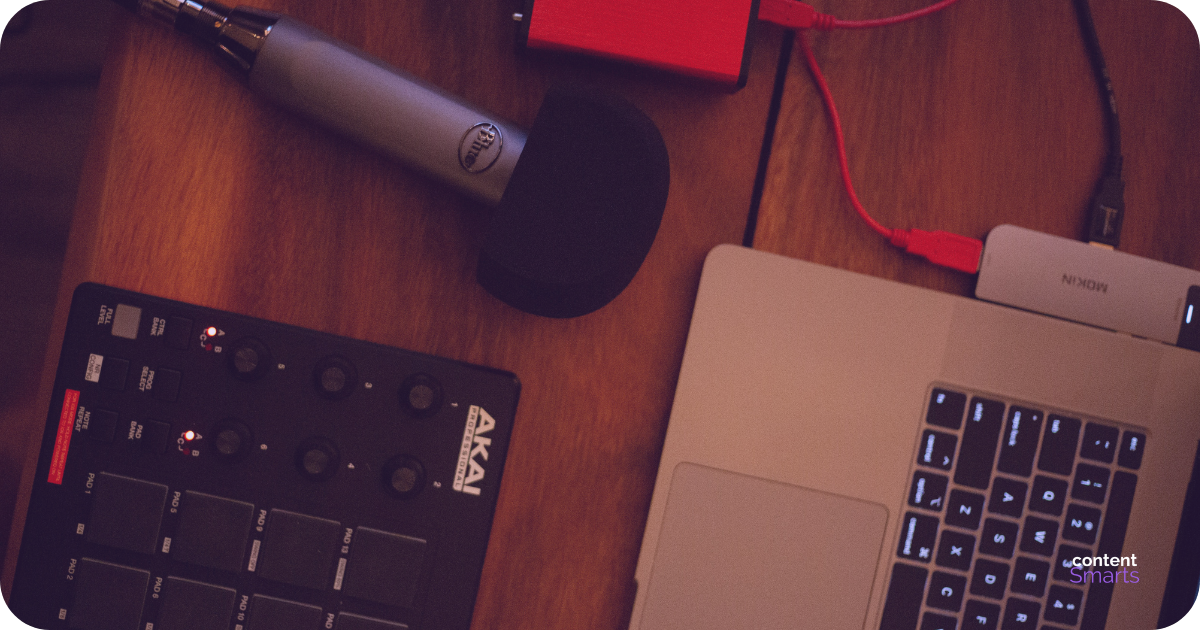How Do I Become a Content Creator? The Honest Truth About Building Something Real
Becoming a content creator isn’t about chasing trends or viral hacks—it’s about building something real, one imperfect post at a time.

I was scrolling through TikTok the other day when I saw a video of a 19-year-old explaining how she made $50,000 last month from her "content creation business." The comments were filled with people asking the same question: "How do I become a content creator?"
Here's the thing that struck me about that video—and about most content creation advice you'll find online. It makes it sound easy. Like there's some secret formula you can follow, some hack you can implement, and boom—you're the next big influencer making bank from your bedroom.
That's not how this works. That's not how any of this works.
I've been creating content in various forms for over a decade. I've seen the landscape change dramatically, watched platforms rise and fall, and witnessed countless people chase the creator dream only to burn out six months later. I've also seen people build genuine, sustainable businesses around their creativity and expertise.
The difference between those who make it and those who don't isn't luck, timing, or even talent. It's understanding what content creation actually is—and what it isn't.
So let me tell you the truth about becoming a content creator. Not the highlight reel version you see on social media, but the real, messy, sometimes uncomfortable truth that nobody wants to talk about.
First, Let's Get Real About What You're Actually Asking
When you ask "How do I become a content creator?" what you're really asking is one of these questions:
- How do I make money from my creativity?
- How do I build an audience that cares about what I have to say?
- How do I turn my knowledge or passion into something valuable?
- How do I escape the 9-to-5 and work for myself?
These are all valid questions. But here's what I wish someone had told me when I started: content creation is not a career—it's a skill that enables careers.
You don't become "a content creator" the same way you become a doctor or a lawyer. You become someone who uses content creation to build something bigger. Maybe that's a business, a personal brand, a movement, or just a way to share your expertise with the world.
The sooner you understand this distinction, the better off you'll be.
The Uncomfortable Truth About Starting
Here's what nobody tells you about becoming a content creator: you're going to suck at first.
I mean really, truly suck. Your first videos will be awkward. Your first blog posts will ramble. Your first Instagram posts will get three likes—and two of them will be from your mom.
This is normal. This is expected. This is part of the process.
But here's where most people quit. They create five pieces of content, see that they're not going viral, and decide they're "not cut out for this." They compare their day one to someone else's day 1,000 and wonder why they're not seeing the same results.
Stop doing that.
When I started my first blog in 2010, I wrote for eight months before anyone besides my friends read it. Eight months of writing into what felt like a void. But those eight months taught me how to write, how to think about my audience, and how to develop my voice.
You need your own version of those eight months. Not because suffering builds character (though it does), but because competence takes time to develop.
The Five Things You Actually Need to Get Started
Forget the expensive cameras, the perfect lighting setup, and the fancy editing software. Here's what you actually need to become a content creator:
1. Something Worth Saying
This sounds obvious, but you'd be surprised how many people skip this step. They see that content creation can be profitable and jump straight to "What should I post?" without ever asking "What do I actually know or care about?"
Your content needs to come from one of three places:
- Your expertise: What do you know that others want to learn?
- Your experience: What have you been through that others are going through?
- Your perspective: What unique way do you see the world?
Notice I didn't say "your passion." Passion is great, but passion without value to others is just a hobby. You need to find the intersection between what you care about and what others need.
2. The Willingness to Be Consistently Inconsistent
Here's a paradox for you: you need to be consistent, but you also need to be willing to experiment and change.
Consistency doesn't mean posting the same type of content at the same time every day (though that can help). It means consistently showing up, consistently providing value, and consistently being yourself.
But you also need to be willing to try new things, pivot when something isn't working, and evolve as you learn more about your audience and yourself.
I've changed my content focus at least five times over the years. Each time, I lost some followers and gained others. Each time, I got closer to creating something that truly resonated.
3. Patience for the Long Game
Content creation is not a get-rich-quick scheme. It's not even a get-rich-medium scheme. It's a build-something-valuable-over-time scheme.
Most successful content creators I know took 2-3 years to build something sustainable. Some took longer. A few got lucky and did it faster, but they're the exception, not the rule.
If you're not willing to commit to at least two years of consistent effort with uncertain results, this probably isn't for you. And that's okay. Better to know that now than to quit six months in feeling like a failure.
4. The Ability to Handle Rejection Daily
Every day as a content creator, you put yourself out there. Every day, the internet has the opportunity to ignore you, criticize you, or tell you that you're doing it wrong.
Most days, that's exactly what happens.
You'll post something you're proud of and get crickets. You'll share a personal story and have someone tell you it's stupid. You'll offer advice and have someone explain why you're wrong.
This isn't a bug in the system—it's a feature. The internet is a brutal feedback mechanism, but it's also an honest one. If you can learn to separate useful criticism from noise, it will make you better.
But you have to be able to handle it emotionally. If negative comments or low engagement send you into a spiral, you need to work on that before you start creating content publicly.
5. A Platform and a Plan (But Not the Ones You Think)
Everyone obsesses over which platform to choose. Instagram or TikTok? YouTube or LinkedIn? Blog or podcast?
Here's the truth: the platform doesn't matter as much as you think it does.
What matters is that you pick one platform and commit to understanding it deeply. Don't try to be everywhere at once. Pick the platform where your audience is most likely to be and where you can create content consistently.
But here's the more important part: you need to own your audience.
Social media platforms come and go. Algorithms change. Accounts get banned. If all your audience is on someone else's platform, you don't really have an audience—you're just borrowing one.
Start building an email list from day one. I don't care if you only have ten followers. Start collecting email addresses. This is the only way to truly own your relationship with your audience.
The Step-by-Step Process (That Actually Works)
Okay, enough philosophy. You want practical steps. Here they are:
Step 1: Define Your Why (And Write It Down)
Before you create a single piece of content, you need to know why you're doing this. Not "to make money" or "to be famous"—those are outcomes, not reasons.
Your why might be:
- To help people avoid the mistakes you made
- To share knowledge that took you years to learn
- To build a business around your expertise
- To create a community around something you care about
Write it down. Put it somewhere you'll see it when you want to quit (and you will want to quit).
Step 2: Choose Your Lane
You can't be everything to everyone. You need to pick a niche—not because you'll be stuck there forever, but because you need somewhere to start.
Your niche should be specific enough that you can become known for something, but broad enough that you won't run out of things to say.
Instead of "fitness," try "strength training for busy parents."
Instead of "business advice," try "marketing for service-based businesses."
Instead of "lifestyle content," try "sustainable living in small spaces."
Step 3: Study Your Chosen Platform
Don't just start posting randomly. Spend a month studying your chosen platform. What content performs well? What doesn't? How do successful creators in your niche structure their content?
This isn't about copying—it's about understanding the rules of the game you're playing.
Step 4: Create Your First 30 Pieces of Content
Before you worry about growth, engagement, or monetization, just focus on creating 30 pieces of content. This will teach you more about content creation than any course or book ever could.
Don't overthink it. Don't try to make each piece perfect. Just create and publish consistently.
Step 5: Analyze and Adjust
After your first 30 pieces, look at what worked and what didn't. Which pieces got the most engagement? Which ones felt most natural to create? Which ones provided the most value to your audience?
Double down on what's working. Eliminate what isn't.
Step 6: Start Building Your Email List
From piece 31 onward, every piece of content should have a way for people to join your email list. Offer a free resource, a newsletter, a mini-course—something valuable in exchange for their email address.
This is how you start owning your audience instead of just borrowing it.
Step 7: Engage Like Your Life Depends on It
Content creation isn't just about creating—it's about building relationships. Respond to every comment. Engage with other creators in your space. Be genuinely helpful and interested in your community.
This is the part most people skip, and it's why most people fail.
Step 8: Experiment with Monetization
Once you have a small but engaged audience (even 100 people who actually care about what you say), start experimenting with ways to monetize. This might be:
- Affiliate marketing for products you actually use
- Creating your own digital products
- Offering services based on your expertise
- Brand partnerships (but be selective)
Don't wait until you have 10,000 followers to start thinking about money. Start small and learn what works.
Step 9: Scale What Works
Once you find a monetization method that works, double down on it. Create systems around it. Optimize it. Then, and only then, consider expanding to other platforms or revenue streams.
The Mistakes That Will Kill Your Progress
I've made every mistake in the book, and I've watched countless others make them too. Here are the big ones to avoid:
Mistake #1: Chasing Vanity Metrics
Followers, likes, views—these numbers feel important, but they're often meaningless. I know creators with 100,000 followers who make less money than creators with 1,000 engaged subscribers.
Focus on engagement, email subscribers, and revenue. Everything else is just ego food.
Mistake #2: Trying to Be Everywhere
You see successful creators on every platform and think you need to be too. You don't. Master one platform before you even think about expanding to others.
Mistake #3: Copying Instead of Learning
There's a difference between studying successful creators and copying them. Study their strategies, their consistency, their value proposition. Don't copy their content, their personality, or their exact approach.
Mistake #4: Giving Up Too Early
Most people quit right before things start working. They create content for three months, don't see massive results, and assume they're not cut out for it.
Three months is nothing in content creation time. Give yourself at least a year before you even think about quitting.
Mistake #5: Ignoring Your Audience
Your audience will tell you what they want if you listen. They'll comment, ask questions, and share their struggles. Pay attention to this feedback and create content that addresses it.
Too many creators fall in love with their own ideas and ignore what their audience actually needs.
The Reality Check You Need to Hear
Here's what I wish someone had told me when I started: most people who try to become content creators will fail.
Not because they're not talented or smart or creative. They'll fail because they're not willing to do the work when it's boring, unglamorous, and unrewarding.
They'll fail because they want the outcome without the process.
They'll fail because they think content creation is about the content, when it's really about the relationships you build through that content.
But here's the thing: if you're willing to do the work—really do the work—you can succeed.
Not because success is guaranteed, but because so few people are actually willing to stick with it long enough to get good at it.
What Success Actually Looks Like
Success as a content creator doesn't look like what you see on social media. It's not private jets and designer clothes and millions of followers.
Real success looks like:
- Having the freedom to work on projects you care about
- Building genuine relationships with people who value what you create
- Making enough money to live comfortably while doing work that matters to you
- Having a platform to share ideas and make a positive impact
It's quieter than you think. It's more sustainable than you think. And it's more fulfilling than you think.
Your Next Steps
If you've read this far, you're probably serious about this. Good. Here's what you need to do next:
- Write down your why. Be specific. Be honest.
- Choose your niche. Pick something you can talk about for the next two years without getting bored.
- Pick one platform. Just one. The one where your audience is most likely to be.
- Create your first piece of content. Don't overthink it. Just create something and put it out there.
- Commit to 30 days. Create and publish something every day for 30 days. This will teach you more than any course ever could.
Remember: you're not trying to become "a content creator." You're trying to become someone who uses content creation to build something meaningful.
The internet doesn't need another person posting random thoughts and hoping for the best. But it does need your unique perspective, your hard-earned knowledge, and your authentic voice.
The question isn't whether you can become a content creator. The question is whether you're willing to do the work to become someone worth following.
The choice is yours. Choose wisely.


